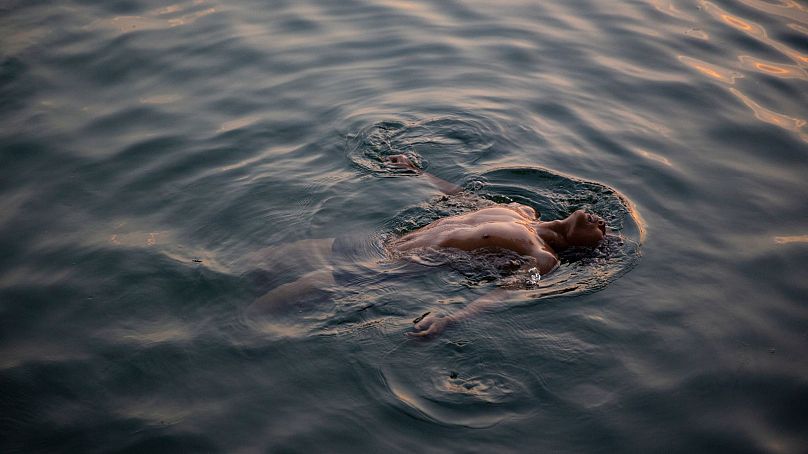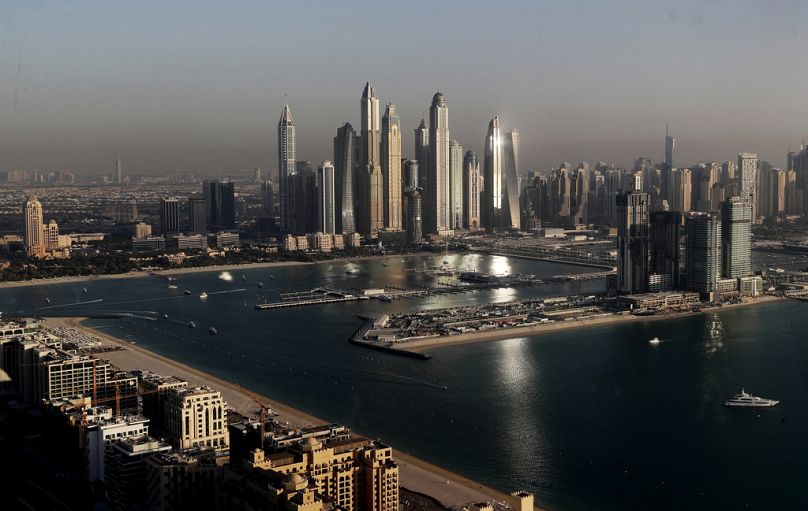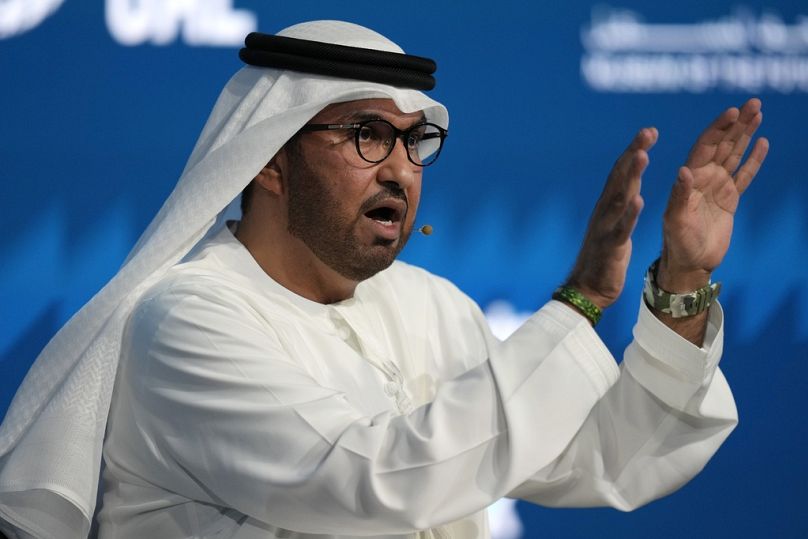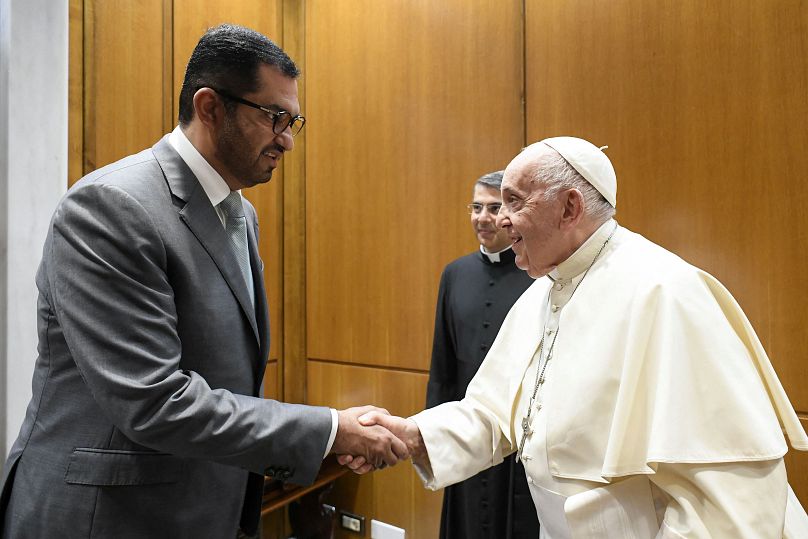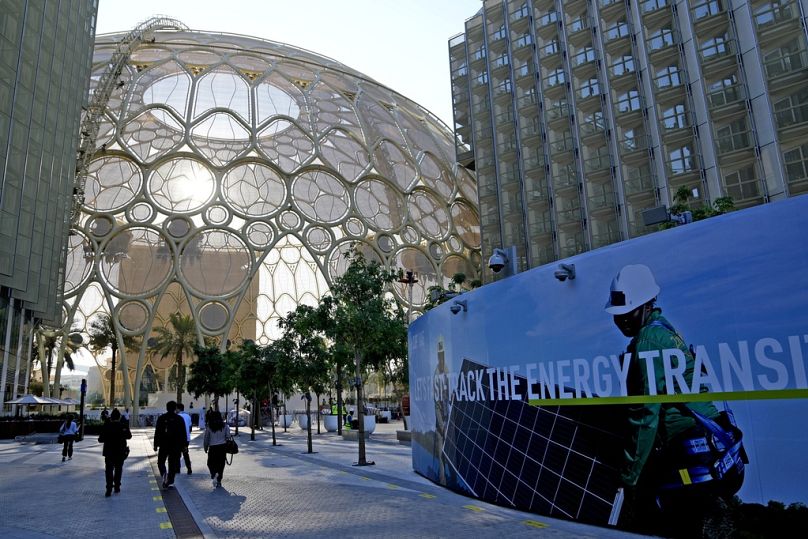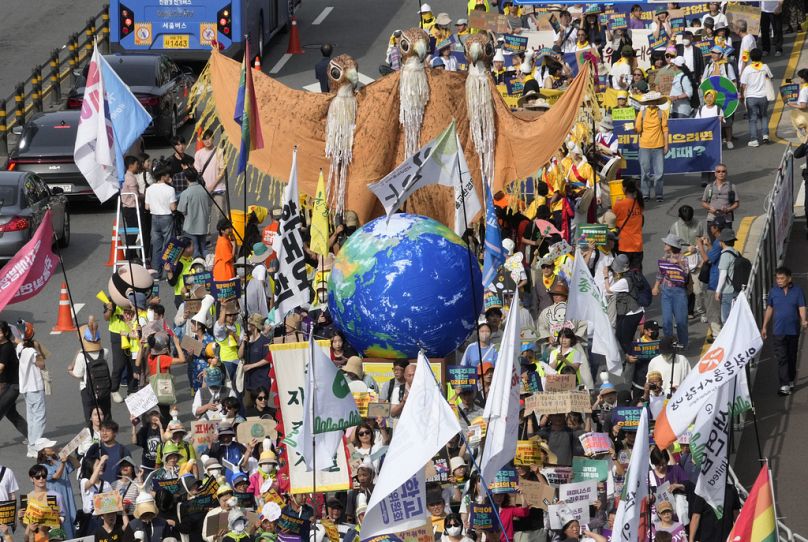After a record-shattering year, the world is looking to the United Nations conference in the UAE this week to put us on a safer path.
World leaders are gathering in the UAE this week on a mission to curb climate change.
 ADVERTISEMENT
ADVERTISEMENT
 ADVERTISEMENT
ADVERTISEMENT
As the summit’s name suggests, COP28 is the 28th iteration of this UN climate conference.
And as another year of devastating extreme weather has made deadly clear - from record Greek wildfires to Libyan floods made 50 times worse by global warming - we’ve not tackled it yet. This month, the EU's Copernicus Climate Change Service said that global temperatures had briefly exceeded 2C above pre-industrial averages for the first time.
Scientists say 2023 is now virtually certain to be the hottest year on record, as time runs out to keep global warming below 1.5C above pre-industrial levels - as per the Paris Agreement decided at COP21.
So can our governments honour their previous promises, and seize the opportunity to put the world on a safer path? Here’s everything you need to know in the run-up.
Euronews Green will be at COP28 in Dubai bringing you exclusive stories, interviews and reactions from inside the UN climate summit. Follow our coverage here, and our updates on Instagram and X (formerly Twitter).
What is COP28?
The UN Climate Change Conference (the official name for Climate Conferences of the Parties) has happened every year since 1995. These two-week summits are an important space for world leaders, politicians, experts and a whole host of other relevant parties to discuss the climate crisis on a global level.
The annual conferences bring together those who signed the United Nations Framework Convention on Climate Change (UNFCCC) - an international environmental treaty addressing climate change - 30 years ago.
Every UN member state is a signatory for the UNFCCC, as well as Palestine, the Cook Islands and Niue. The Holy See (or Government of Vatican City) is also an observer of the treaty. Effectively every nation, country, or state in the world is involved, giving a total of 197 signatory parties.
Each year representatives from each party come together to discuss action on climate change for the Conference of the Parties or COP. Following COP27 in Egypt last year, the 28th COP is being hosted in Dubai, in the United Arab Emirates (UAE).
When is COP28?
COP28 is taking place over two weeks, from 30 November to 12 December.
The fortnight of negotiations will kick off with a World Climate Action Summit on 1 and 2 December, which will convene heads of state and government alongside civil society leaders.
This unique-to-COP28 event is intended to serve as a platform for major announcements and build momentum for the rest of the summit.
The UAE’s thematic programme here shows when key climate-related issues will be in the spotlight. As well as the usual days dedicated to finance, energy and nature, the presidency has introduced some new themes this year - including a for health.
The final negotiations are scheduled for 11 and 12 December, but COPs are notorious for over-running. COP27 in Sharm El-Sheikh didn’t deliver a final agreement until two days later than originally planned.
Where is COP28 taking place?
The UAE is hosting COP this year in the international hub of Dubai, the capital of the country’s most populated emirate.
Different regions of the world take turns hosting the summit, and this year it was due to be held by a country in the Asia-Pacific group.
More specifically, Dubai is hosting the event in its Expo City - an area described as a ‘future-centric mini-city’ - connected to the centre by metro.
There are two main sites for the event: the Blue Zone and the Green Zone. The former is where the official negotiations take place, bringing together the delegates and observers through discussions, exhibits and cultural activities.
Adjacent to this UN-managed space is the Green Zone, run by the COP28 UAE Presidency. This is open to all stakeholders including youth, civil societies, Indigenous peoples and NGOs, as well as members of the public.
And there’s a particular emphasis on the private sector this year - which the official website says will have an opportunity to showcase its “contributions and solutions” to climate change.
Why is COP28’s choice of president so controversial?
The UAE’s president-designate is Dr Sultan Al Jaber, the country’s special envoy for climate change for the last three years. He’s also the CEO of Abu Dhabi National Oil Company (ADNOC) - a position that many see as incompatible with leading the world’s climate crisis response.
After his appointment was announced earlier this year, more than 130 lawmakers from Europe and the US wrote to the UN, EU Commission President and Biden demanding his withdrawal.
Climate campaigners have condemned the “polluting influence” of the fossil fuel industry on the COP process. “It is beyond satire,” activists from Fossil Free London told Euronews Green before an oil conference protest in London this month.
“Now an oil CEO is literally, rather than purely figuratively, at the head of it.”
It is the first time the CEO of any company, let alone an oil firm, has headed the conference.
Documents recently seen by the BBC suggest that the UAE may have plotted to use its role as host as an opportunity to strike oil and gas deals. Leaked briefing notes reportedly revealed plans to discuss fossil fuel deals with 15 nations, according to the British national broadcaster.
But Al Jaber does have his defenders, some of whom claim his business background is an asset.
A recent report from six experts in the Global South, including Senior Advisor to the United Nations Environment Program (UNEP) Professor Ibrahim Ozdemir, analysed the five most recent presidencies and drew some optimistic conclusions about this one.
Despite the optics, they found that the COP28 agenda offers a promising pathway to accelerate a transition away from fossil fuels and a necessary restructuring of climate finance.
As with Egypt last year, Dubai is also a controversial host because of its record on human rights. Though the country has said climate activists will be allowed to protest “peacefully”, NGO Human Rights Watch has repeatedly warned that the state has “zero tolerance for dissent.”
Despite promises of an "inclusive" conference and promises to allow "peaceful assembly", activists have raised concerns over surveillance and potential arrests.
Who is going to be at COP28?
More than 200 governments are invited to Dubai and heads of state or prime ministers from 167 countries have confirmed they are going.
Leaders from France, Germany, India, Brazil, Japan and the UK are among those who are set to deliver statements on their nation's climate commitments.
The two of the world's biggest emitters, however, are unlikely to have their leaders present.
China's President Xi Jinping is not expected to attend. While US President Joe Biden is not planning on travelling to the summit, officials have now announced that Vice President Kamala Harris will be attending in his place.
UK Prime Minister Sunak confirmed last month that he will attend (while making some controversial rowbacks on Britain’s net zero policies).
Britain’s King Charles III is also set to attend on behalf of the government and give the opening address. This will be his third time doing so, following COP26 in Glasgow and COP21 in Paris. The new monarch, renowned for his climate campaigning, was reportedly discouraged from attending last COP last year.
Pope Francis has had to cancel his trip to Dubai for COP28 on doctors' orders, the Vatican said on Tuesday. The pope has been receiving treatment for lung inflammation but doesn't have pneumonia, according to reports.
The 86-year-old pontiff has been outspoken about climate issues and was meant to attend the UN conference between the 1 and 3 December.
In total, 70,000 people are expected to attend the summit - more than any other COP so far.
Heads of state will be vastly outnumbered by delegates from environmental NGOs, think tanks, faith groups, private sector representatives, indigenous community leaders and other organisations.
Last year, a report compiled by the organisations Corporate Accountability, Global Witness and Corporate Europe Observatory found that more than 600 fossil fuel lobbyists made an appearance at COP27.
That was more delegates than the combined total of the ten countries most impacted by climate change and 25 per cent more than were at COP26. What happens this year remains to be seen - but new UN rules mean that fossil fuel employees will have to disclose their fossil fuel ties from the start.
What can we expect from COP28?
The Presidency has outlined four key goals this year, alongside the negotiations process:
- Fast-tracking a just, orderly and equitable energy transition.
- Fixing climate finance.
- Putting nature, lives and livelihoods at the heart of climate action.
- And mobilising for the most inclusive COP so far.
Speeding up the energy transition is set to be the main issue, as countries remain divided over how to tackle the world’s unsustainable use of fossil fuels.
The EU will be pushing for a world-first deal to phase out the "unabated" global use of coal, oil and gas. Other negotiating blocks and countries are likely to push back on this - including major fossil fuel producers like Saudi Arabia, and developing countries which are relying on fossil fuels to grow their economies.
There's also a push for a deal to triple global renewable energy capacity and double the rate at which energy efficiency is improving by 2030. It's less divisive than plans to phase out fossil fuels but some - including the EU - have said they won't commit to one without the other.
The need for an ambitious agreement will be underscored by the first-ever Global Stocktake at the start of the summit. This ‘report card’ on climate progress will show how far countries are from meeting their commitments under the Paris Agreement to limit global warming.
It paves the way for some course correction in countries' climate plans to get the world back on track.
Loss and damage funding dominated discussions at COP27 - with the agreement to set up such a fund celebrated as a major victory last year.
Earlier this month a groundbreaking blueprint for the fund was agreed in Abu Dhabi and the decision will be formally adopted at COP28. It relies on the World Bank acting as a middleman to control negotiations and timelines around the distribution of funds.
This has been a controversial point for countries in the Global South who fear a lack of representation and participation in the process or possible biases. The US has made some objections to the agreement too over whether Loss and Damage contributions will be voluntary or not.
The EU has said it will announce a "substantial" contribution to the fund at CO28 as well - hopefully encouraging other major historic emitters to do the same.
Why is COP28 so important?
Given the slow pace of change compared to the speed of climate change and the urgency required, fatigue with the official process is understandable.
But it’s also, as experts the world over argue, the best process we’ve got.
“It’s generally frustrating,” Michai Robertson, senior finance negotiator for the Alliance of Small Island States (AOSIS) told Euronews Green earlier this year.
“Because of how we make decisions, on the basis of consensus, and the UNFCCC and the multilateral process, you have to really go at the pace of your slowest person.”
But this also lends it a unique legitimacy “that maybe no other process in the world” can achieve, he says.
Securing a Loss and Damage fund was a major achievement last year. As was the legally binding Paris Agreement reached in 2015.
Policies implemented as a result of that COP agreement will see fossil fuel demand peak by 2030, according to the International Energy Agency (IEA), perhaps even as soon as this year.
But much stronger policies are needed to keep within 1.5C of global warming, the IEA warns, with current climate plans leaving the world on track for nearly 3C of warming this century.
With frontline countries already reeling from the impacts of 1.1C, the task of COP28 couldn’t be more urgent.











